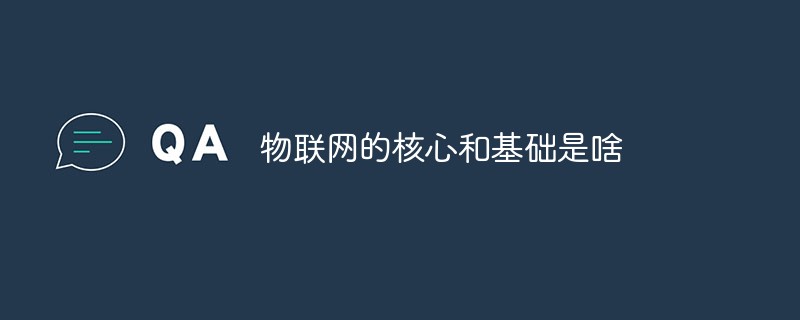
The core and foundation of the Internet of Things is the "Internet". The Internet of Things is the "Internet where everything is connected". It is a network that is extended and expanded based on the Internet. It combines various information sensing devices with the network to form a huge network. interconnection of things. The Internet of Things is an information carrier based on the Internet, traditional telecommunications networks, etc., which allows all ordinary physical objects that can be independently addressed to form an interconnected network.

The operating environment of this tutorial: Windows 7 system, Dell G3 computer.
The Internet of Things (IoT for short) refers to the real-time collection of any needs through various information sensors, radio frequency identification technology, global positioning systems, infrared sensors, laser scanners and other devices and technologies. Monitor, connect, and interact objects or processes, collect their sound, light, heat, electricity, mechanics, chemistry, biology, location and other required information, and realize things and things, things and things through various possible network access The ubiquitous connection of people enables intelligent perception, identification and management of items and processes. The Internet of Things is an information carrier based on the Internet, traditional telecommunications networks, etc., which allows all ordinary physical objects that can be independently addressed to form an interconnected network.
The Internet of Things is the "Internet where everything is connected". It is an extended and expanded network based on the Internet. It combines various information sensing devices with the network to form a huge network that can realize any time and any place. Location, interconnection of people, machines and things.
The Internet of Things is an important part of the new generation of information technology. The IT industry is also called: Pan-Internet, which means that things are connected and everything is connected. Therefore, "the Internet of Things is the Internet where things are connected." This has two meanings: first, the core and foundation of the Internet of Things is still the Internet, which is an extension and expansion of the network based on the Internet; secondly, its client extends and expands to any item and Information exchange and communication between items. Therefore, the definition of the Internet of Things is to connect any item to the Internet through radio frequency identification, infrared sensors, global positioning systems, laser scanners and other information sensing equipment according to the agreed protocol to exchange information and communicate. A network for intelligent identification, positioning, tracking, monitoring and management of items.
Basic Characteristics of the Internet of Things
Basic Characteristics of the Internet of Things From the perspective of communication objects and processes, the information interaction between things and things and people and things is The core of networking. The basic characteristics of the Internet of Things can be summarized as overall perception, reliable transmission and intelligent processing.
Overall perception - You can use radio frequency identification, QR codes, smart sensors and other sensing devices to perceive and obtain various types of information about objects.
Reliable transmission—Through the integration of the Internet and wireless networks, object information is transmitted in real time and accurately to facilitate information exchange and sharing.
Intelligent processing - using various intelligent technologies to analyze and process the data and information sensed and transmitted to achieve intelligent monitoring and control. Based on the above characteristics of the Internet of Things, combined with the perspective of information science, and around the flow process of information, the information processing functions of the Internet of Things can be summarized:
(1) The function of obtaining information. It is mainly the perception and identification of information. The perception of information refers to the perception and sensitivity of the attribute state of things and the way they change; the identification of information refers to the ability to express the felt state of things in a certain way.
(2) The function of transmitting information. It mainly involves the steps of information sending, transmission, reception, etc., and finally the task of transmitting the acquired state of things information and the way it changes from one point in time (or space) to another point. This is what is often referred to as the communication process.
(3) Function of processing information. It refers to the process of information processing, using existing information or perceived information to generate new information, which is actually the process of making decisions.
(4) Function of effect information. It refers to the process in which information finally exerts its effect. It has many forms of expression. The more important thing is to always keep the object in a pre-designed state by adjusting the state of the object and its transformation method.
For more related knowledge, please visit the FAQ column!
The above is the detailed content of What is the core and foundation of the Internet of Things. For more information, please follow other related articles on the PHP Chinese website!